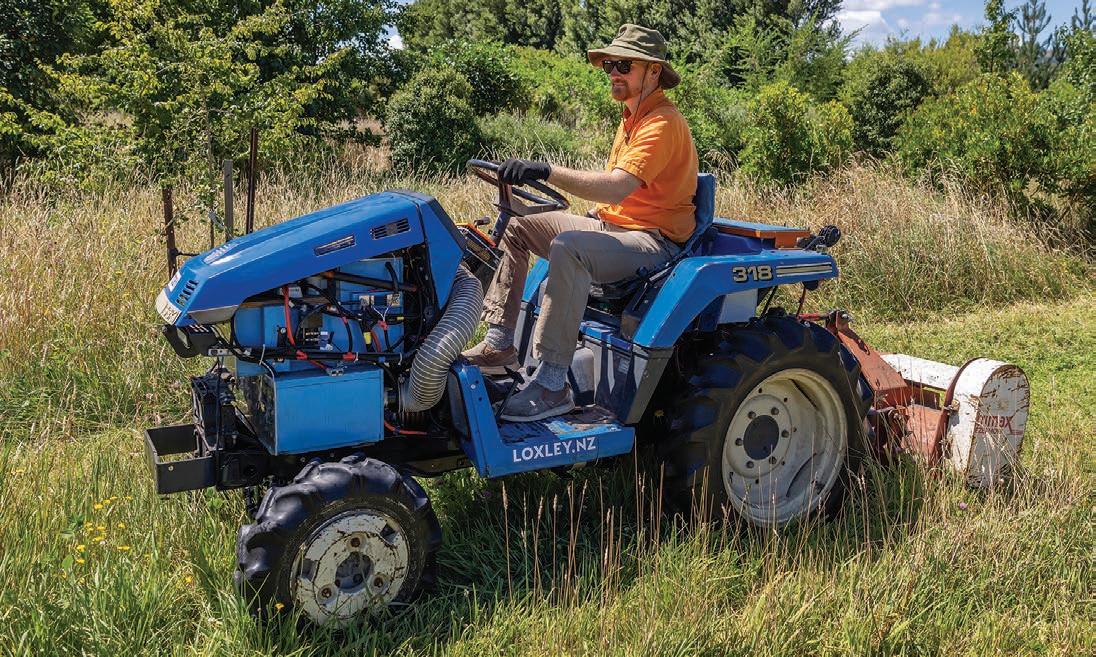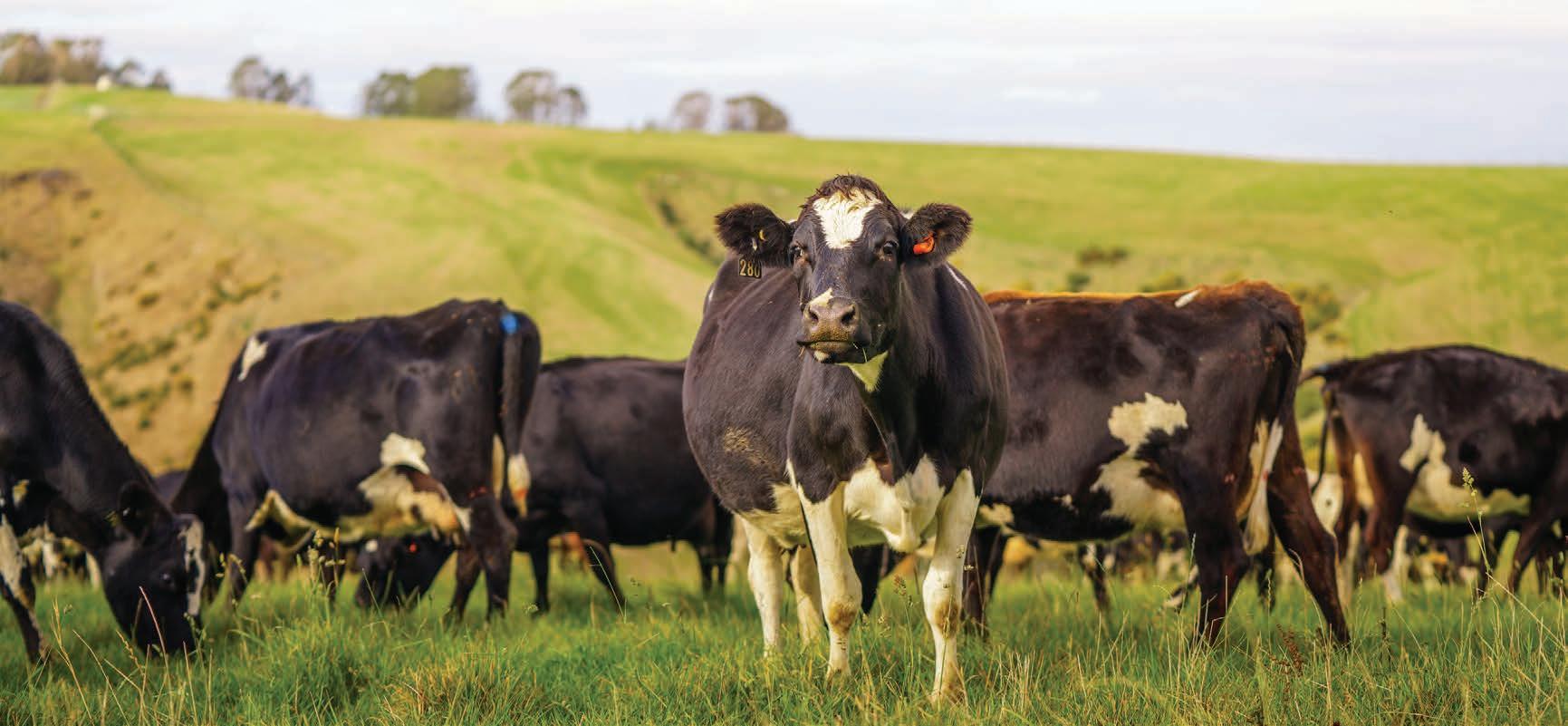
5 minute read
Innovations
by AgriHQ
Adding value through energy
By Cheyenne Nicholson
The electric revolution could soon include farm machinery leading to greater savings for farmers.
Each year 52 million tonnes of carbon is produced by agricultural machinery. Our reliance on fossil fuels to grow and produce our food is significant and provides challenges both to the day-today running costs for food producers and greenhouse gas emissions. One
New Zealand company is out to help change all that with the power of electricity.
Loxley Innovations is a Christchurchbased company looking to create and produce electric tractors. Founder
Duncan Aitken says that opportunities for electric tractors run beyond fuel savings.
“It’s looking at things in the long-term view. What we are creating is an electric tractor that runs off and can produce electricity. Having that ability to generate electricity to then feed back to your house or farm infrastructure can improve the farm’s resilience.”
The initial idea for the venture started on Aitken’s Christchurch lifestyle block.
Needing to get on top of grass growth on the block, he invested in a rideon lawnmower but found the user experience lacking and the ongoing costs undesirable.
“I used it a lot on-farm, but figured there had to be a better way of doing it.
I had a look at electric alternatives, but there weren’t any that were cost-effective for me. So I converted an old ride-on lawnmower with a broken engine to battery electric,” he says.
The conversion took a few months while Aitken navigated a full-time job and learned how to convert diesel to electric.
“I hadn’t really had much experience with that sort of thing, but I thought ‘Oh
I’ll just give it a crack’. I found it really interesting, and it came quite naturally.
There are a lot of resources out there so you can teach yourself practically anything these days,” he says.
The converted lawnmower provided a quieter ride and fewer maintenance costs. But with 10 acres to maintain, he quickly realised he needed something bigger. His search for an electric tractor began, but he was left wanting again. So naturally, he converted his own. He created a 48-volt system, which is one where the tractor can be used to support their home power usage and potentially feed into the PowerGrid when the prices are right.
“One day the prices weren’t favourable to feed back into the grid, we weren’t getting enough solar power generated and I wanted to cook dinner. I was able to use the battery in the tractor to feed back into the house network to power the oven to cook dinner,” he says.
Seven years after tinkering in his shed making his own electric tractor, Aitken decided the conditions and landscape were finally right to turn his idea for electric tractors into something tangible.
“Five years ago when I first wanted to start doing this, the landscape wasn’t quite right. Now with electric cars becoming increasingly popular, more will follow, like tractors. The designs and ideas we have for them aren’t the same as what I made in my shed, that was more proof of concept,” he says.
The team are looking to build a tractor that is fully optimised for efficiency, doing away with as many of the complex transmission parts as possible in order to keep maintenance costs low and upfront costs viable.
Loxley isn’t just about building a neat electric tractor, but looking at the bigger picture of energy use on-farm and the potential for optimisation for the whole farm system. Being able to cook dinner with his homebuilt converted tractor was
Loxley Innovations founded by Duncan Aitken, is a Christchurch-based company looking to create and produce electric tractors. Duncan test drives an electric tractor.
the aha moment that highlighted his idea meant a tractor could become even more useful.
“A lot of tractors sit idle for many months of the year, so the idea that you could increase utilisation with electricity seems like a good fit. Being able to use it as essentially a big battery to power other parts of your operation,” he says.
Aitken estimates that the total cost of ownership for electric tractors when you’re optimising it for other energy uses, will be around 52% less than diesel equivalents. Calculations as part of their market research suggest that they could reduce emissions from 25 tonnes a year per tractor (diesel) down to one tonne a year per tractor on New Zealand’s current grid mix of renewable and fossil energy.
“Our idea is the culmination of where we are now technologically. The benefits that will come with mass production of electric vehicles will be there for larger vehicles, and we want to get ahead of that curve and be leading this change,” he says.
While the increase in electricity has some worrying about the grid not being able to support the increased power demands, this isn’t quite the case.
“Electric vehicles aren’t the problem. They’re actually part of the solution to grid instability if we use them intelligently – that’s what we’re aiming to do,” he says.
One of the big challenges facing electric agriculture machinery is finding the ideal market for their product.
“We can’t come straight out and compete with 100-litre diesel tank tractors, so it’s finding that sweet spot to start with. We are focusing on the 60 horse power space targeting the likes of horticulture, high-value crops like kiwifruit, vineyards and so on. We also see a place for them in wintering barns with the low noise and zero emissions improving livestock wellbeing,” he says.
There is opportunity in the regenerative agriculture space as well, with both electric and regenerative agriculture focusing on the long-term resilience and sustainability of the land and business and of course, electric being a lowemission, low-impact option for working the land.
Aitken and the Loxley team are one of the startups taking part in the threemonth Sprout 2022 Accelerator and he says that the support, guidance and networking he’s gained from the Accelerator has been invaluable in getting Loxley into the next steps of their venture.
“There’s a lot of puzzle pieces that need to fall into place, including funding and building the team, but we are hoping prototypes aren’t too far away, at which stage we’ll begin the on-farm trials. We’d love to hear from farmers or landowners who would be interested in a 60hp electric tractor,” he says. n


Farmer testimonials











